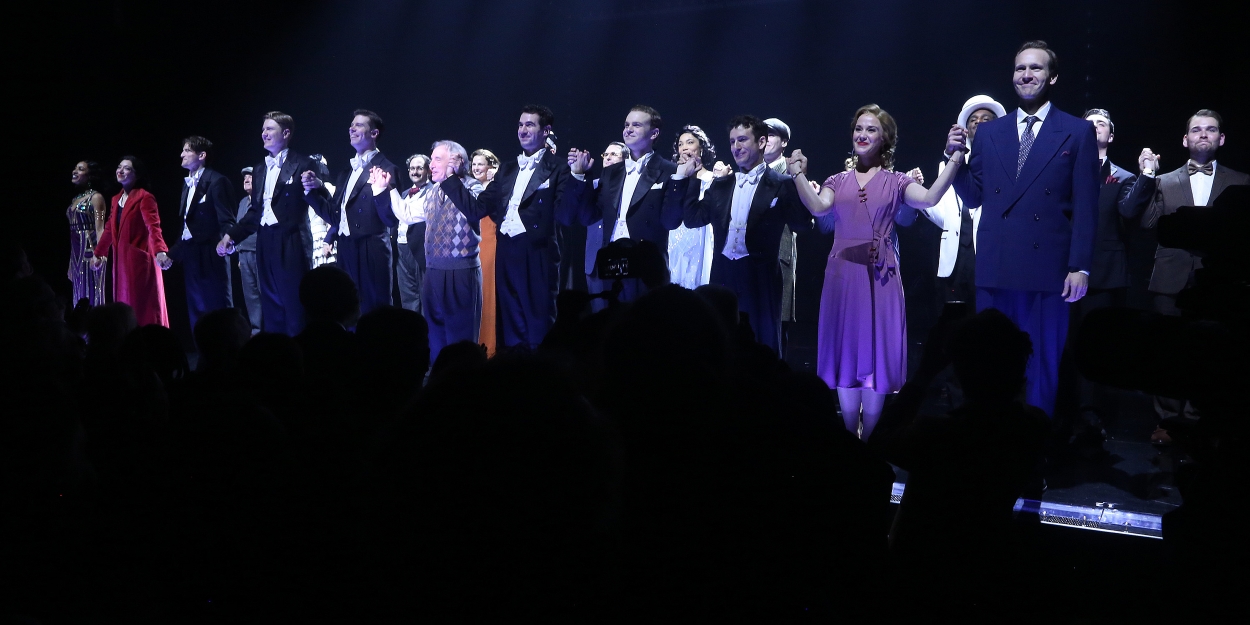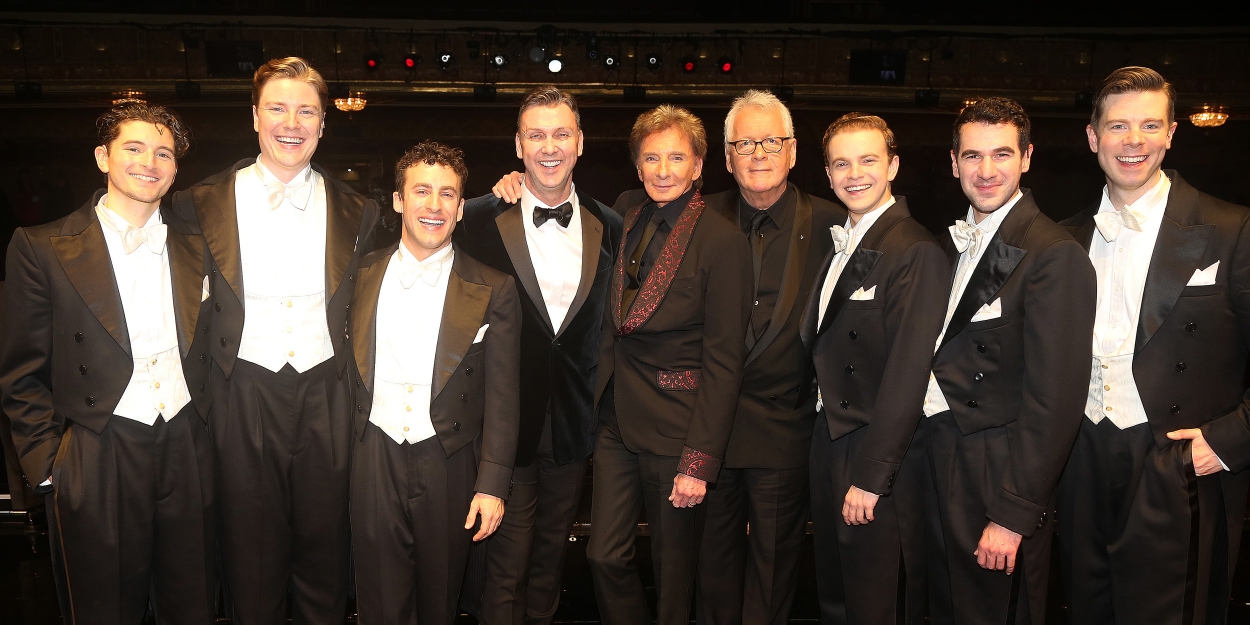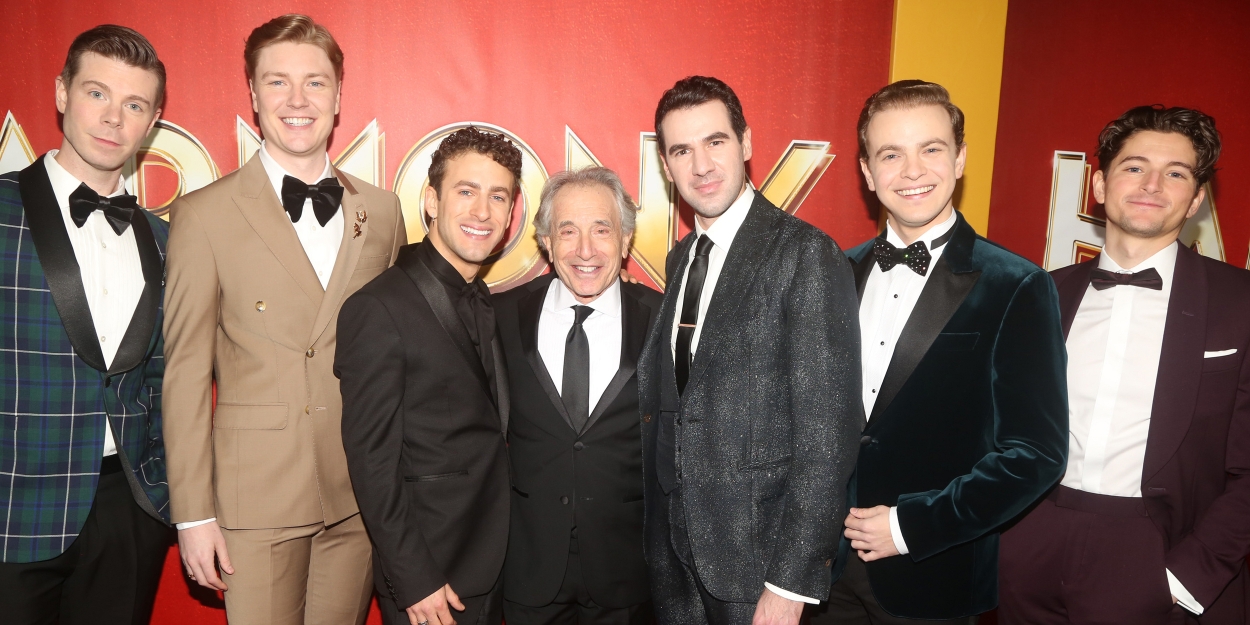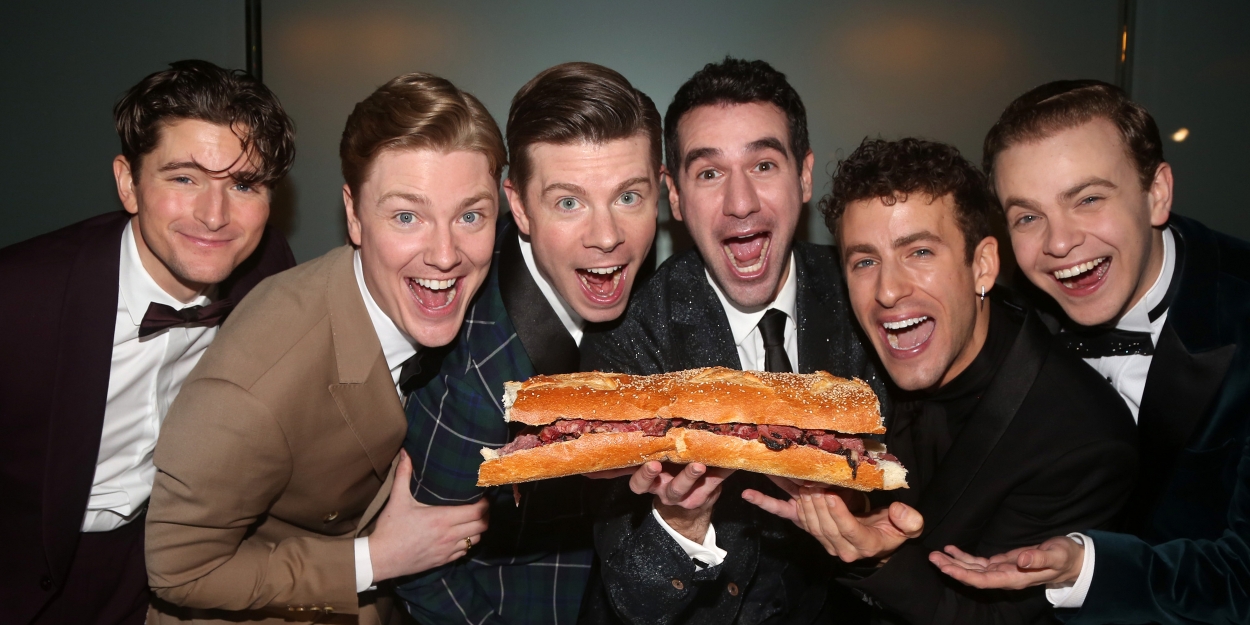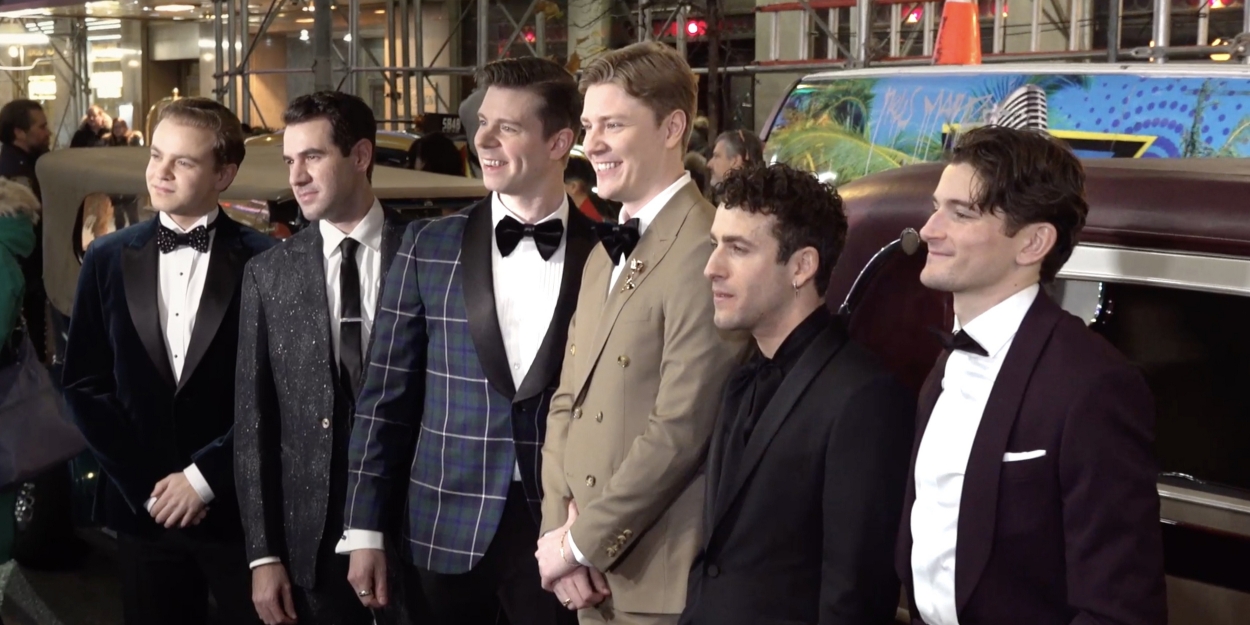Review Roundup: HARMONY Opens On Broadway! See What the Critics Are Saying!
The original musical is based on the true story of the musical group, The Comedian Harmonists, one of the most successful groups in Germany and around the globe.
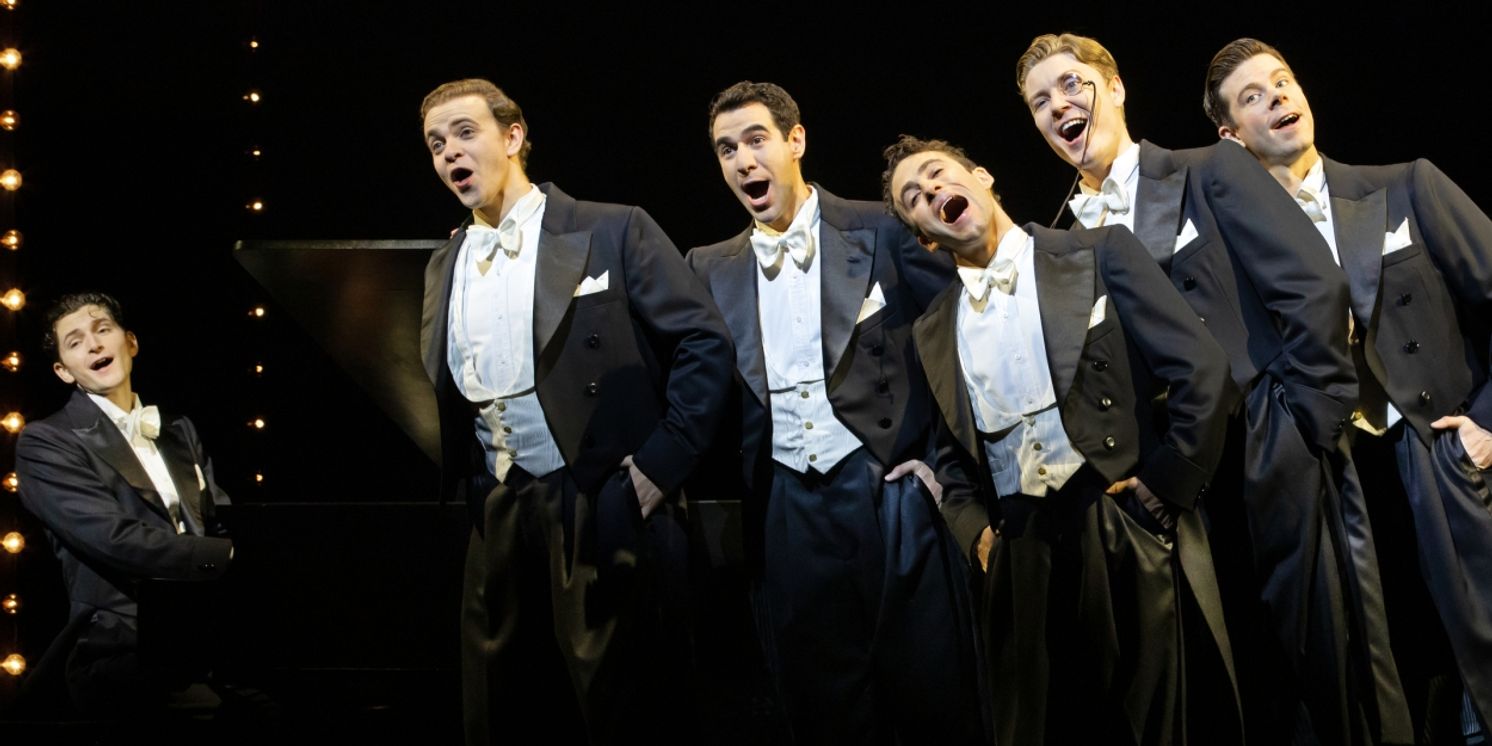
The new Barry Manilow and Bruce Sussman musical Harmony opens on Broadway tonight. Read the reviews!
The original musical is based on the true story of the musical group, The Comedian Harmonists, one of the most successful groups in Germany and around the globe. In the 1920’s and 30’s they sold millions of records, made dozens of films and sold-out the biggest venues around the world from Carnegie Hall to the London Palladium.
They were considered one of the original boy bands with their heavenly harmonies and musical comedy antics. The Harmonists are played by Sean Bell, Danny Kornfeld, Zal Owen, Eric Peters, Blake Roman, and Steven Tesley.
Harmony boasts a total of 20 Broadway debuts with five of the six Harmonists taking their first bows on a Broadway stage. Harmony officially opens on Monday, November 13, 2023.
Harmony features an original new score by legendary Tony, Grammy, and Emmy Award® winner Barry Manilow with lyrics and book by Drama Desk Award Winner, Bruce Sussman. Directed and choreographed by Tony Award winner Warren Carlyle (The Music Man, Hello Dolly!), this timely and captivating rags-to-riches story lost to history comes to dazzling life with a sensational cast of Broadway favorites.
The show stars Chip Zien; Sierra Boggess; Julie Benko; the Comedian Harmonists Sean Bell, Danny Kornfeld, Zal Owen, Eric Peters, Blake Roman, and Steven Telsey; Allison Semmes and Andrew O’Shanick. They join Zak Edwards, Dan Hoy, Bruce Landry, RhonniRose Mantilla, Daniel Z. Miller, Benjamin H. Moore, Matthew Mucha, Constantine Pappas, Kayleen Seidl, Kyla Stone, Bronwyn Tarboton, Kate Wesler, Stuart Zagnit, and Lee Zarrett.
The creative team for Harmony includes Beowulf Boritt (scenic design), Linda Cho & Ricky Lurie (costume design), Jules Fisher + Peggy Eisenhauer (lighting design), Dan Moses Schreier (sound design), batwin + robin productions (media design), Tom Watson (wig & hair design), Jamibeth Margolis, CSA (casting), Sara Edwards (associate director/choreographer), John O’Neill (music director), Michael Aarons (music coordinator), Doug Walter (orchestrations) and Scott Taylor Rollison (production stage manager).
![]() Jesse Green, The New York Times: But the version of “Harmony” that opened on Monday at the Ethel Barrymore Theater, after a potholed, decades-long trek to Broadway, makes a beeline for the bleakest parts of the tale and then bleakens them further. Sussman’s script, relentlessly focused on historical trauma, takes reasonable dramatic license with the group’s actual history, but only in one direction: darker. And though Warren Carlyle’s production is smart and slick, it traps the tale in a figurative and literal glassy black box (by Beowulf Boritt) from which only pathos escapes.
Jesse Green, The New York Times: But the version of “Harmony” that opened on Monday at the Ethel Barrymore Theater, after a potholed, decades-long trek to Broadway, makes a beeline for the bleakest parts of the tale and then bleakens them further. Sussman’s script, relentlessly focused on historical trauma, takes reasonable dramatic license with the group’s actual history, but only in one direction: darker. And though Warren Carlyle’s production is smart and slick, it traps the tale in a figurative and literal glassy black box (by Beowulf Boritt) from which only pathos escapes.
![]() Adam Feldman, Time Out New York: The six actor-singers who play the Comedian Harmonists—Sean Bell, Danny Kornfeld, Zal Owen, Eric Peters, Blake Roman and Steven Tesley, five of whom are making their Broadway debuts—blend together beautifully without disappearing into anonymity; each of them gets a song in which to shine as a soloist, including a standout proposal song for Kornfeld as the younger Rabbi. This is admirable, but it is also perhaps one of the show’s limitations. Manilow’s music, an attractive blend of old and new sounds, is mostly well served by Sussman’s lyrics, and the result is a series of entertaining moments. But the show’s determination to give everyone equal time spreads the storytelling thin; major potential plot lines about divisions within the group, such as a romantic triangle and a temptation to collaborate with the Nazis, are raised and then abandoned. And when Harmony arrives, inevitably, at the Holocaust—when it moves from show-off to Shoah—the show’s tone gets pitchy.
Adam Feldman, Time Out New York: The six actor-singers who play the Comedian Harmonists—Sean Bell, Danny Kornfeld, Zal Owen, Eric Peters, Blake Roman and Steven Tesley, five of whom are making their Broadway debuts—blend together beautifully without disappearing into anonymity; each of them gets a song in which to shine as a soloist, including a standout proposal song for Kornfeld as the younger Rabbi. This is admirable, but it is also perhaps one of the show’s limitations. Manilow’s music, an attractive blend of old and new sounds, is mostly well served by Sussman’s lyrics, and the result is a series of entertaining moments. But the show’s determination to give everyone equal time spreads the storytelling thin; major potential plot lines about divisions within the group, such as a romantic triangle and a temptation to collaborate with the Nazis, are raised and then abandoned. And when Harmony arrives, inevitably, at the Holocaust—when it moves from show-off to Shoah—the show’s tone gets pitchy.
![]() Matt Windman, amNY: Unfortunately, “Harmony” contains a weak score, with surprisingly generic and bland music by Manilow (none of which stands up to his wonderfully catchy pop hits), and pedestrian lyrics by Sussman (who also wrote the comparatively stronger book). It does not help that “Harmony” is so similar in setting, manner, and politics to the comparatively superior “Cabaret,” which is about to receive a new Broadway revival. In fact, “Harmony” often feels like a combination of “Cabaret,” “Jersey Boys,” and Rodgers & Hammerstein love duets.
Matt Windman, amNY: Unfortunately, “Harmony” contains a weak score, with surprisingly generic and bland music by Manilow (none of which stands up to his wonderfully catchy pop hits), and pedestrian lyrics by Sussman (who also wrote the comparatively stronger book). It does not help that “Harmony” is so similar in setting, manner, and politics to the comparatively superior “Cabaret,” which is about to receive a new Broadway revival. In fact, “Harmony” often feels like a combination of “Cabaret,” “Jersey Boys,” and Rodgers & Hammerstein love duets.
![]() Jesse Hassenger, The Guardian: Perhaps the confusion is understandable; the musical has been on its way to Broadway for a quarter-century at this point, with Manilow and Sussman running versions of the show in San Diego, Atlanta and Los Angeles. (An earlier Broadway bid was canceled 20 years ago, and an off-Broadway production ran for a month in 2022 after several Covid delays.) The production that’s finally arrived feels like it’s had plenty of time to marinate in its own importance.
Jesse Hassenger, The Guardian: Perhaps the confusion is understandable; the musical has been on its way to Broadway for a quarter-century at this point, with Manilow and Sussman running versions of the show in San Diego, Atlanta and Los Angeles. (An earlier Broadway bid was canceled 20 years ago, and an off-Broadway production ran for a month in 2022 after several Covid delays.) The production that’s finally arrived feels like it’s had plenty of time to marinate in its own importance.
![]() Emlyn Travis, Entertainment Weekly: For the last two decades, Barry Manilow and his longtime writing partner Bruce Sussman have worked tirelessly to bring Harmony: A New Musical to Broadway. The show, which opens at the Ethel Barrymore Theater on Nov. 13, chronicles the true story of the Comedian Harmonists, a six-membered German vocal group that rose to popularity in the late 1920s only to be completely erased from history because it featured Jewish members. With Harmony, Manilow and Sussman succeed in shining a light on a moving and timely tale, but the show doesn't truly begin to sing until its second act.
Emlyn Travis, Entertainment Weekly: For the last two decades, Barry Manilow and his longtime writing partner Bruce Sussman have worked tirelessly to bring Harmony: A New Musical to Broadway. The show, which opens at the Ethel Barrymore Theater on Nov. 13, chronicles the true story of the Comedian Harmonists, a six-membered German vocal group that rose to popularity in the late 1920s only to be completely erased from history because it featured Jewish members. With Harmony, Manilow and Sussman succeed in shining a light on a moving and timely tale, but the show doesn't truly begin to sing until its second act.
![]() Chris Jones, Chicago Tribune: Theater sophisticates often take harmonizing for granted as a fundamental part of the craft, akin to learning lines. But to many Broadway audience members, it’s a rare pleasure and the vocal arrangements here (by Manilow and John O’Neill), come with an uncommon amount of theatricality — well, uncommon unless you are a longtime Manilow fan, given his decadeslong mastery of the kind of arrangements that bring anthems to a climax and people to their feet. The score will have its detractors, perhaps, as did much of what Manilow created, early on. But those will be snobby views, oblivious of his incomparable skills in musical communication.
Chris Jones, Chicago Tribune: Theater sophisticates often take harmonizing for granted as a fundamental part of the craft, akin to learning lines. But to many Broadway audience members, it’s a rare pleasure and the vocal arrangements here (by Manilow and John O’Neill), come with an uncommon amount of theatricality — well, uncommon unless you are a longtime Manilow fan, given his decadeslong mastery of the kind of arrangements that bring anthems to a climax and people to their feet. The score will have its detractors, perhaps, as did much of what Manilow created, early on. But those will be snobby views, oblivious of his incomparable skills in musical communication.
![]() Jackson McHenry, Vulture: What’s the use of frivolity in an unstable time? That’s the question asked, in form and content, by Harmony, a light curio of a musical that comes with a riptide of political anxiety. The songs are by Barry Manilow; the setting is Germany in the years before World War II; the tonal incongruity you might deduce from that juxtaposition is, mostly, the point. Harmony takes for its subject the Comedian Harmonists, a sextet of singers formed in Berlin at the end of the 1920s, who toured the world until the Nazi regime turned on the group. The show aims to re-create the crew’s winningly sophomoric onstage antics and try to thread them into a large political history, and it tends to be better when addressing the former than the later, though its by-the-book history hits, at least glancingly, at compelling unease.
Jackson McHenry, Vulture: What’s the use of frivolity in an unstable time? That’s the question asked, in form and content, by Harmony, a light curio of a musical that comes with a riptide of political anxiety. The songs are by Barry Manilow; the setting is Germany in the years before World War II; the tonal incongruity you might deduce from that juxtaposition is, mostly, the point. Harmony takes for its subject the Comedian Harmonists, a sextet of singers formed in Berlin at the end of the 1920s, who toured the world until the Nazi regime turned on the group. The show aims to re-create the crew’s winningly sophomoric onstage antics and try to thread them into a large political history, and it tends to be better when addressing the former than the later, though its by-the-book history hits, at least glancingly, at compelling unease.
![]() Greg Evans, Deadline: Manilow and his longtime writing partner and collaborator Bruce Sussman have set out to answer that very question, and Harmony accomplishes that goal handily. As a musical, Harmony occasionally soars, occasionally stumbles, but the former more often than the latter. With a structure that takes fewer chances than one might hope, Harmony is nonetheless steadily compelling and not infrequently stirring, attributes that speak as much to the Manilow-Sussman craftsmanship as to an intriguing tale long-lost to history.
Greg Evans, Deadline: Manilow and his longtime writing partner and collaborator Bruce Sussman have set out to answer that very question, and Harmony accomplishes that goal handily. As a musical, Harmony occasionally soars, occasionally stumbles, but the former more often than the latter. With a structure that takes fewer chances than one might hope, Harmony is nonetheless steadily compelling and not infrequently stirring, attributes that speak as much to the Manilow-Sussman craftsmanship as to an intriguing tale long-lost to history.
![]() Charles Isherwood, The Wall Street Journal: Timely it may sadly be, but a theatrical triumph it still isn’t. I reviewed the show back in 1997, and while it is changed and improved, it rarely rises above a level of admirable, hard-working professionalism. The score, with music by Mr. Manilow and lyrics by Mr. Sussman, is appealingly various—influences range from Gilbert and Sullivan to cantorial melodies to Kurt Weill to standard contemporary Broadway balladry. (There is even a salsa-flavored song that seems to consciously evoke “Copacabana.”) But it lacks any truly singular or gut-grabbing songs. And the book by Mr. Sussman is hamstrung by both the breadth of the history it seeks to depict and a need to leaven the increasingly dark proceedings with generous dollops of Borscht Beltish humor.
Charles Isherwood, The Wall Street Journal: Timely it may sadly be, but a theatrical triumph it still isn’t. I reviewed the show back in 1997, and while it is changed and improved, it rarely rises above a level of admirable, hard-working professionalism. The score, with music by Mr. Manilow and lyrics by Mr. Sussman, is appealingly various—influences range from Gilbert and Sullivan to cantorial melodies to Kurt Weill to standard contemporary Broadway balladry. (There is even a salsa-flavored song that seems to consciously evoke “Copacabana.”) But it lacks any truly singular or gut-grabbing songs. And the book by Mr. Sussman is hamstrung by both the breadth of the history it seeks to depict and a need to leaven the increasingly dark proceedings with generous dollops of Borscht Beltish humor.
![]() Johnny Oleksinki, The New York Post: Zien’s wealth of experience is paired with exciting young talent. Five of the Harmonists are making their Broadway debuts, and all of them are tremendous singers. And, most poignantly, the show’s forceful rallying cry against anti-Semitism and for peaceful coexistence is relevant and movingly reverberates. How depressing it is to remember that the very same thing was being said last season about the musical “Parade” and Tom Stoppard’s play “Leopoldstadt.” The problem is that while “Harmony” is about a sextet of singers whose voices blend like milk and coffee, its elements do not similarly fuse into a cohesive and satisfying musical. The show, directed and choreographed by Warren Carlyle, has been tinkered with by Manilow and lyricist/book-writer Bruce Sussman for nearly 30 years, but on its largest stage yet it still doesn’t quite work.
Johnny Oleksinki, The New York Post: Zien’s wealth of experience is paired with exciting young talent. Five of the Harmonists are making their Broadway debuts, and all of them are tremendous singers. And, most poignantly, the show’s forceful rallying cry against anti-Semitism and for peaceful coexistence is relevant and movingly reverberates. How depressing it is to remember that the very same thing was being said last season about the musical “Parade” and Tom Stoppard’s play “Leopoldstadt.” The problem is that while “Harmony” is about a sextet of singers whose voices blend like milk and coffee, its elements do not similarly fuse into a cohesive and satisfying musical. The show, directed and choreographed by Warren Carlyle, has been tinkered with by Manilow and lyricist/book-writer Bruce Sussman for nearly 30 years, but on its largest stage yet it still doesn’t quite work.
![]() Peter Marks, The Washington Post: Barry Manilow and Bruce Sussman had been striving for years to acquaint Broadway patrons with this group’s true story. Their stick-to-itiveness finally paid off with “Harmony,” the efficient if formulaic “new” musical that marked its official opening Monday night at the Ethel Barrymore Theatre.
Peter Marks, The Washington Post: Barry Manilow and Bruce Sussman had been striving for years to acquaint Broadway patrons with this group’s true story. Their stick-to-itiveness finally paid off with “Harmony,” the efficient if formulaic “new” musical that marked its official opening Monday night at the Ethel Barrymore Theatre.
![]() Tim Teeman, Daily Beast: However, the musical—music by Manilow, book and lyrics by Sussman, directed and choreographed by Warren Carlyle—only makes an occasionally compelling case that the Harmonists (Ari Leshnikoff, Erich Collin, Erwin “Chopin” Bootz, Robert Biberti, Harry Frommerman, and Cantor Josef Roman Cykowski, aka “Rabbi”) should be better remembered by history. The unevenly staged Harmony is a shakily constructed set of misfiring elements, whose most compelling beats around Nazism, Antisemitism, and bigotry—all points resoundingly and rightly made—feel imposed and didactic rather than flowing naturally from the source material.
Tim Teeman, Daily Beast: However, the musical—music by Manilow, book and lyrics by Sussman, directed and choreographed by Warren Carlyle—only makes an occasionally compelling case that the Harmonists (Ari Leshnikoff, Erich Collin, Erwin “Chopin” Bootz, Robert Biberti, Harry Frommerman, and Cantor Josef Roman Cykowski, aka “Rabbi”) should be better remembered by history. The unevenly staged Harmony is a shakily constructed set of misfiring elements, whose most compelling beats around Nazism, Antisemitism, and bigotry—all points resoundingly and rightly made—feel imposed and didactic rather than flowing naturally from the source material.
![]() Jonathan Mandell, New York Theater: It took a quarter century for Manilow and Sussman to bring “Harmony” to New York, presented by the National Yiddish Theater Folksbiene, which seemed fitting, and was one reason it was exciting. So much has changed since then in the world; so much has changed in the last month! The show feels now like an occasionally enjoyable entertainment more than something we need to see.
Jonathan Mandell, New York Theater: It took a quarter century for Manilow and Sussman to bring “Harmony” to New York, presented by the National Yiddish Theater Folksbiene, which seemed fitting, and was one reason it was exciting. So much has changed since then in the world; so much has changed in the last month! The show feels now like an occasionally enjoyable entertainment more than something we need to see.
![]() David Cote, Observer: To be honest, I slightly dreaded this one, after suffering through A Beautiful Noise a year ago. But although Manilow and Neil Diamond share similarities—Jewish soft-rockers big in the ’70s with kitschy afterlives—Harmony aims higher than jukebox navel-gazing. A story this compelling could have made a good musical—with less narration, more character development, and a finale that milked the nostalgia less. Needless to say, a tale of innocent people caught in a nauseating wave of antisemitism hits harder in our present moment. Director and choreographer Warren Carlyle skillfully weaves the elements together and gets the Harmonists—a handsome six-pack of triple threats—on their feet and dancing. Lovable tummler Zien gives his all to a self-recriminatory 11th-hour number about failing to save the group—call it “Rabbi’s Turn.” You might leave humming the title tune, but also unsatisfied. Well, he wrote the song.
David Cote, Observer: To be honest, I slightly dreaded this one, after suffering through A Beautiful Noise a year ago. But although Manilow and Neil Diamond share similarities—Jewish soft-rockers big in the ’70s with kitschy afterlives—Harmony aims higher than jukebox navel-gazing. A story this compelling could have made a good musical—with less narration, more character development, and a finale that milked the nostalgia less. Needless to say, a tale of innocent people caught in a nauseating wave of antisemitism hits harder in our present moment. Director and choreographer Warren Carlyle skillfully weaves the elements together and gets the Harmonists—a handsome six-pack of triple threats—on their feet and dancing. Lovable tummler Zien gives his all to a self-recriminatory 11th-hour number about failing to save the group—call it “Rabbi’s Turn.” You might leave humming the title tune, but also unsatisfied. Well, he wrote the song.
![]() Joey Sims, Theatrely: For all these issues, the last section of Harmony still packs a punch. The focus turns back to the older Rabbi, as he reckons with crushing guilt and the burden of memory. A devastating 11 o’clock number, “Threnody,” starts as Rabbi’s personal lament but grows into an elegy for all that was lost – every life, every story, all the hope and beauty snuffed out by unimaginable hatred. Zien embodies, in this number, a pain beyond description, and it is wrenching. How could it not be? Yet the searching depth of this finale cannot make up for a broadly unfulfilling work.
Joey Sims, Theatrely: For all these issues, the last section of Harmony still packs a punch. The focus turns back to the older Rabbi, as he reckons with crushing guilt and the burden of memory. A devastating 11 o’clock number, “Threnody,” starts as Rabbi’s personal lament but grows into an elegy for all that was lost – every life, every story, all the hope and beauty snuffed out by unimaginable hatred. Zien embodies, in this number, a pain beyond description, and it is wrenching. How could it not be? Yet the searching depth of this finale cannot make up for a broadly unfulfilling work.
![]() Sandy MacDonald, New York Stage Review: You would think that a recording superstar on the level of Barry Manilow (85 million records sold) might enjoy a bit of a step up when attempting to get a show mounted on Broadway. You’d be wrong: From its conception some 30 years ago, Harmony hit every conceivable bump in the road, starting with a few fizzling out-of-town tryouts and a Covid delay before National Yiddish Theatre Folksbiene succeeded in introducing it – to considerable acclaim – at the Museum of Jewish Heritage in the spring of 2022. Certain elements remain: Beowulf Boritt’s simple but snazzy black-patent-leather-like box of a set and Warren Carlyle’s snappy direction and choreography continue to contribute plenty of sizzle. If a few clunker lines from longtime collaborator Bruce Sussman’s book and lyrics have managed to survive the transfer, the damage is minimal – perhaps because the storylines are so broadly limned to begin with.
Sandy MacDonald, New York Stage Review: You would think that a recording superstar on the level of Barry Manilow (85 million records sold) might enjoy a bit of a step up when attempting to get a show mounted on Broadway. You’d be wrong: From its conception some 30 years ago, Harmony hit every conceivable bump in the road, starting with a few fizzling out-of-town tryouts and a Covid delay before National Yiddish Theatre Folksbiene succeeded in introducing it – to considerable acclaim – at the Museum of Jewish Heritage in the spring of 2022. Certain elements remain: Beowulf Boritt’s simple but snazzy black-patent-leather-like box of a set and Warren Carlyle’s snappy direction and choreography continue to contribute plenty of sizzle. If a few clunker lines from longtime collaborator Bruce Sussman’s book and lyrics have managed to survive the transfer, the damage is minimal – perhaps because the storylines are so broadly limned to begin with.
![]() David Finkle, New York Stage Review: There was a time when reviewers excited about an opening would resort to the “Run, don’t walk…” plug. You don’t hear it much nowadays. Nonetheless, I’m reviving it for Harmony, the superb new musical for which Barry Manilow wrote the tunes and Bruce Sussman wrote the lyrics and book. Be advised not even to run but to race to this tale of a six-man Berlin singing group that was founded in 1927, became an international sensation by the early 1930s, and disbanded when Hitler decided that the three Jewish members must no longer appear on stage but were better off leaving the country, as they were able to do. Sounds like a grim story, and it is. But not completely so, as the title suggests and as its authors hope in an implied message that remains as cogent today, when antisemitism in on the rise domestically and globally. Whether that wished-for goal is attainable or not, Manilow, Sussman and crew are ebulliently pushing for harmony musically and societally.
David Finkle, New York Stage Review: There was a time when reviewers excited about an opening would resort to the “Run, don’t walk…” plug. You don’t hear it much nowadays. Nonetheless, I’m reviving it for Harmony, the superb new musical for which Barry Manilow wrote the tunes and Bruce Sussman wrote the lyrics and book. Be advised not even to run but to race to this tale of a six-man Berlin singing group that was founded in 1927, became an international sensation by the early 1930s, and disbanded when Hitler decided that the three Jewish members must no longer appear on stage but were better off leaving the country, as they were able to do. Sounds like a grim story, and it is. But not completely so, as the title suggests and as its authors hope in an implied message that remains as cogent today, when antisemitism in on the rise domestically and globally. Whether that wished-for goal is attainable or not, Manilow, Sussman and crew are ebulliently pushing for harmony musically and societally.
![]() Elysa Gardner, The New York Sun: Mr. Manilow, who has always shown a flair for infusing melody with drama (or melodrama, at times), and who’s better educated in the music of this period than most of his peers, let alone more contemporary pop artists, has provided the company with both haunting romantic ballads and snazzy production numbers. Mr. Carlyle serves the latter with predictable buoyancy and wit; one romp catches the Harmonists without their pants, while a more darkly comic sequence casts them as marionettes, mocking the servile behavior their fellow Germans have been forced to adopt.
Elysa Gardner, The New York Sun: Mr. Manilow, who has always shown a flair for infusing melody with drama (or melodrama, at times), and who’s better educated in the music of this period than most of his peers, let alone more contemporary pop artists, has provided the company with both haunting romantic ballads and snazzy production numbers. Mr. Carlyle serves the latter with predictable buoyancy and wit; one romp catches the Harmonists without their pants, while a more darkly comic sequence casts them as marionettes, mocking the servile behavior their fellow Germans have been forced to adopt.
![]() Amelia Merrill, New York Theatre Guide: Though its quality is not consistent throughout, Harmony has its high points. Julie Benko as Ruth, a daring young Jewish communist, is a firecracker, while Steven Telsey as the Bulgarian tenor Ari Leschnikoff is a comic delight. Sierra Boggess maintains her lovely voice as Mary, though neither the character nor her performance are interesting.
Amelia Merrill, New York Theatre Guide: Though its quality is not consistent throughout, Harmony has its high points. Julie Benko as Ruth, a daring young Jewish communist, is a firecracker, while Steven Telsey as the Bulgarian tenor Ari Leschnikoff is a comic delight. Sierra Boggess maintains her lovely voice as Mary, though neither the character nor her performance are interesting.
Average Rating: 60.5%
- To read more reviews, click here!
- Discuss the show on the BroadwayWorld Forum
Reader Reviews
Powered by
|
Videos

